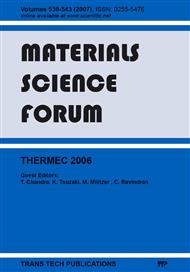p.1701
p.1707
p.1713
p.1719
p.1723
p.1729
p.1735
p.1741
p.1747
The Effect of Twinning on Strain Rate Sensitivity during the Compression of Extruded Magnesium Alloy AZ31
Abstract:
Samples of extruded magnesium alloy AZ31 (nominally 3 wt% Al, 1 wt% Zn, 0.3 wt% Mn, with the balance magnesium) were tested in uniaxial compression at temperatures from room temperature to 200°C. Monotonic and strain rate jump tests were conducted, and strain rate sensitivity, and activation volume were determined. At the lower temperatures tested, strain rate sensitivity was found to increase with strain to a limiting value, whereas at 200°C strain rate sensitivity initially followed a similar trend, but did not reach a limit within the bounds of the test. The effect of temperature on strain rate sensitivity was minor up to 150°C. Activation volume decreased with stress by roughly an order of magnitude over the course of the tests. An analytical model was modified to incorporate strain rate sensitivity, and it is shown that the evolution of material by twinning into an orientation favourable for slip is principally responsible for the trend in strain rate sensitivity with increasing strain.
Info:
Periodical:
Pages:
1723-1728
Citation:
Online since:
March 2007
Authors:
Price:
Сopyright:
© 2007 Trans Tech Publications Ltd. All Rights Reserved
Share:
Citation:


